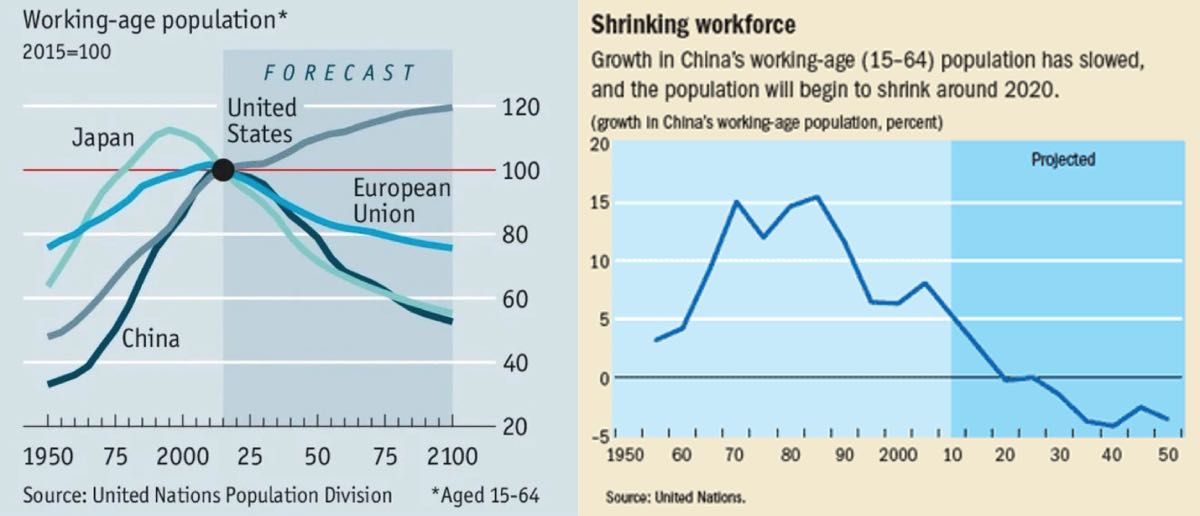Can It be Fixed in Time?
A Quote Worth Repeating:
“Population collapse due to low birth rates is a much bigger risk to civilization than global warming,” (tweet on August 26) — Elon Musk, president of Tesla motors.
Read Part 1 here and Part 2 here
How Do We Solve Depopulation?
The fertility rate for a stable workforce rate is 2.1 births per female (Fertility rate (F.R.)) averaged across all women of childbearing age in a population. Without immigration, the U.S. rate is FR 1.6; with immigration, it is FR 2.3. Legal immigrants currently compose 45 million of the total US population of 350 million. That immigration factor makes the US the lead engine for growing productivity.
The consequences for China (FR 1.3), Japan (FR 1.36), and the European Union (FR 1.5) are shrinking workforces supporting growing retired populations. If the larger portion of working hours of go to providing food, shelter, and medical care to the elderly, fewer hours are available for building the infrastructure to reverse climate change. That is Musk’s point. He is correct.

Can the Third World Compensate for the First World Decline?
Projections make Nigeria the most populous country outside of Asia by 2050. A population of 200 million is projected to reach 400 million. The average age is 20 years old. Perhaps the young can emigrate and supply labor to advanced countries?
Unfortunately, a more granular look reveals that Nigeria is a country nearing collapse. Desert encroachment from the north is reducing arable land. Civil war with Boko Haram shows no sign of abating. There are 2 million Nigerian refugees displaced by civil war and famine and flood in Nigeria.
It has some of the world’s largest slums and a deficient educational system. Care of the elderly is family based; there is no social safety net. One-hundred forty million people live on the coastal plains and already experience sea rise generating annual floods. They have a large petroleum industry nestled along the coast and offshore, which is also subject to natural and man-made dangers: sea rise, storms, and corruption. The country lacks capital and cultural investment. The young will likely be fighting a civil war, rather than seeking foreign higher education.
Can the Productive Countries Retool in Time?
There are 350 million U.S. citizens, of whom 45 million came as immigrants (Pew Research Council). Because of immigration, the United States gets a disproportionate share of highly educated and trained individuals from across the planet, balancing the unskilled labor walking across the Rio Grande. Both groups form families, commit less crime, support the population, and create jobs.
Without immigration, our current birth rate is 1.6, and with immigration, it is 2.3. That immigration difference, plus our educational, transportation, and manufacturing infrastructure makes the United States the world’s engine, which secondarily improves our trading partners’ productive capabilities. EU countries have made substantial commitments to reversing climate change. Not so for India, Brazil, Russia, or most of Africa.
The war in Ukraine is instructive. Every dollar spent on armed conflict in Ukraine takes an available dollar away from climate change investment. But the Ukraine war created a political revolution. NATO countries were reformed by a vision of freedom, and provided food and shelter to millions, and weapons and training to the combatants. What happens when the war ends? Does the vision get transferred to climate change before every river runs dry? Will enough money remain to do so?
Dominant biologic ecologies have gone extinct five times in the history of the earth. The disappearance of the dinosaurs was the Fifth Extinction event. We are now in the early phase of what may be the Sixth Extinction. Thousands of animal and insect species are disappearing at alarming rates as I write this.
Every dollar spent in the arms race between China and it neighbors takes a dollar away from climate change investment. China, with drought-stricken rivers, burnt fields of grain, and massive hydroelectric shortfalls may reassess its priorities of guns over Taiwan vs. butter for the planet. China has a window of several years before its workforce shrinks.
Authoritarian China has the capability to concentrate resources like no other country on earth. Does it join the world’s nations to avert the Sixth Extinction? It can choose to use the final peak of its industrial might supporting a naval crossing of the Taiwan straits or creating alternative energy great enough to eliminate its need for coal fired power. Chairman Xi, this pivot is your chance to shine in glory greater than any Han Emperor.
Elon musk is correct that depopulation of industrialized countries is the most significant impediment to saving the planet (if we don’t squander our natural resources on wars and corruption.) The key to saving the planet is productivity. Be careful about wishing for Zero Population Growth; you may be hastening the end of the earth.

